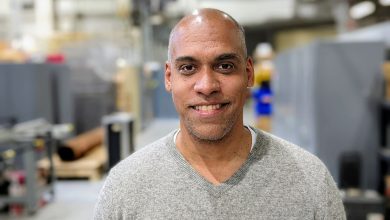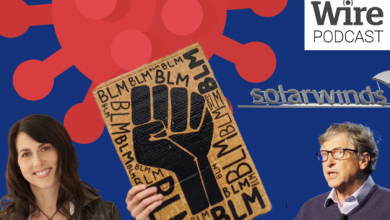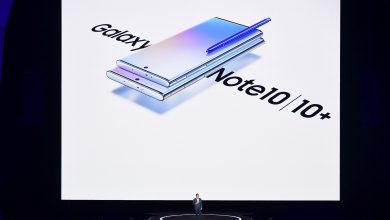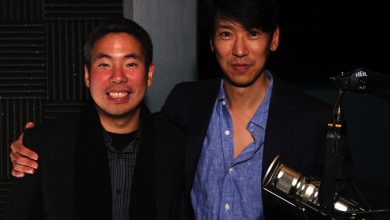An ‘awesome year’? Gates Foundation CEO Sue Desmond-Hellmann has a radical view on 2017
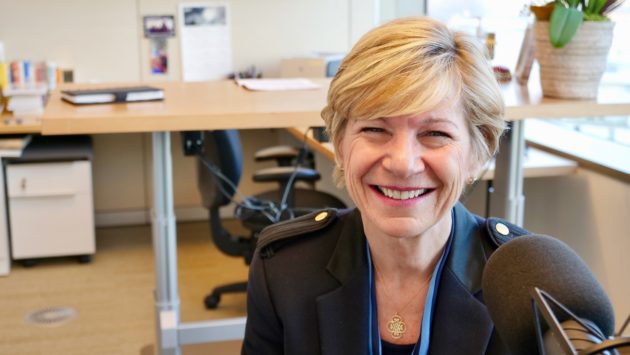
It would be easy for Sue Desmond-Hellmann, CEO of the Bill & Melinda Gates Foundation, to look back on 2017 as a year to forget.
This year has brought a new presidential administration threatening cuts in U.S. foreign aid and global health funding, a major change in leadership at the U.S. Department of Education, and an epidemic of sexual harassment allegations illustrating the ongoing struggle for gender equality — to name just a few of the challenges facing the world in the areas where the Gates Foundation focuses.
What’s more, Desmond-Hellmann herself started 2017 in the hospital, using a walker, after suffering a broken hip in a slow-speed bike crash. But her recovery from that injury is part of what has given her a radically positive outlook on the year.
In reality, she says, many things are going well in the world.
“I never thought that by December of 2017, I’d be running again, cycling, and preparing for ski season,” she says. “So my little experience, I think, is reflective of the bigger experience — which is, it’s all context. It’s all context. And in the world that I live in at Bill & Melinda Gates Foundation, just like my own little experience in 2017, it is way better when you take a step back and reflect. 2017 was an awesome year.”
Desmond-Hellmann reflected on the past year in a podcast with GeekWire this week in her office at Gates Foundation HQ in Seattle. She makes the case for 2017 in her annual Year in Review, published this morning.
She points to developments including the near-elimination of polio; the record number of women with access to contraception; milestones in the fight against neglected tropical diseases; new progress against pandemics; unprecedented numbers of students succeeding in college; and the groundswell of women speaking out against sexual assault.
A physician and scientist, Desmond-Hellmann is finishing her third year as the CEO of the Gates Foundation, leading an organization of 1,500 people seeking breakthroughs in global health and U.S. education, leveraging a philanthropic endowment of more than $40 billion from Microsoft co-founder Bill Gates, philanthropist and activist Melinda Gates, and legendary investor Warren Buffett.
Desmond-Hellmann’s career path seems almost custom-tailored for the role. She developed breakthrough cancer therapies at biotech firm Genentech, spent time in Uganda focusing on HIV/AIDS and other health challenges, and led the University of California at San Francisco as its first female chancellor before joining the Gates Foundation. In a letter on display in her office, Seattle Seahawks coach Pete Carroll calls Desmond-Hellmann’s hiring by the foundation “one of the great Free Agent moves of the last two decades.”
Listen to the podcast with Gates Foundation CEO Sue Desmond-Hellmann above, read her Year in Review at gatesfoundation.org, and continue reading for edited highlights from our conversation. Subscribe via Apple Podcasts, Stitcher, Google Play or wherever you listen to podcasts.
Todd Bishop: What surprised you in 2017? What were some of the highlights?
Sue Desmond-Hellmann: Let’s start with polio. In 1988, there were about 20 cases of polio every 30 minutes. Every half hour, 20 cases of polio. In the entire year of 2017, there have been less than 20 cases so far. That’s extraordinary! We are on the brink of eliminating the second human disease ever in history. First one being smallpox, also an awful disease. And here’s what that means for families and kids: That they won’t be at risk of a paralyzing disease. Just a magnificent thing that the world is closer to than ever before.
Contraception. You talked about the gender discussions that are going on in the world. If you want to give a woman power, if you want a woman to have agency, as people say — control over her own life — her ability to access modern contraception is essential. And we made more progress on that in 2017 than ever in the history of getting contraception to women all over the world.
TB: That really requires a cultural change in a lot of these countries. What have you been seeing changing, in terms of the attitudes toward contraception, even in some religious organizations?
Desmond-Hellmann: Well, here’s the thing that I think that is so astounding. If I’m with Melinda Gates, who really is a leader on this, she starts by listening to women. What do women want, and what do women need? Women want access to modern contraceptives. They want to have control over when they have their children, and there are very good data suggesting that the health of the mother and health of the children is enhanced by spacing your children. Having them at least two years apart or more. Anyone, of any religion, wants healthy moms and children. And so, the utility of contraceptives to help with planning, and the health of the mom and the child in that family, really changes the conversation.
TB: Another highlight, I know, was a record broken, a Guinness World Record set by the Gates Foundation and its partners.
Desmond-Hellmann: One of the aspects of health that the foundation focuses on is what’s called NTDs. And NTDs stand for Neglected Tropical Diseases. So, for those students studying for their exams, these are the kinds of things that often I say I last memorized for my last medical boards. Things like Leishmaniasis, Schistosomiasis — a lot of alphabet soup that’s kinda hard to remember.
So, here’s what you need to know about Neglected Tropical Diseases. They are not a big cause of death, although they can cause death, but they are a big cause of suffering. And they are big cause of suffering in some of the lowest-resource areas of the world. They can cause leg swelling, sores, just really tough things. Keeps people from work. Keeps people from enjoying themselves, and can cause them to be ostracized by colleagues.
The big news in 2017 was that pharmaceutical companies donated 207 million doses within a 24-hour period, for what’s called mass drug administration, to allow the control or prevention of these Neglected Tropical Diseases. So we are making more progress than ever before. And in part, this is due to the generosity of global pharmaceutical companies.
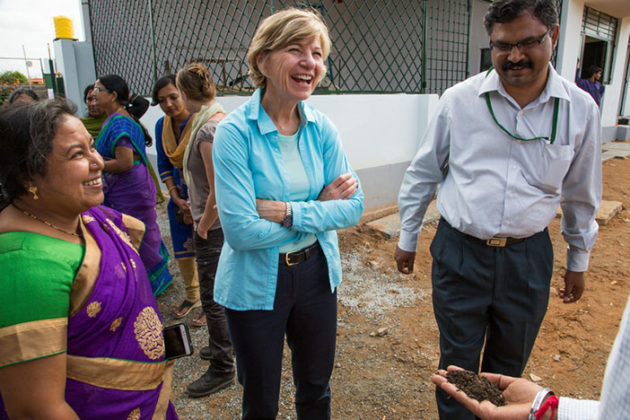
TB: When you look at global health and disease, are there key goals that you think are achievable in the next year, as you look at the past year and the progress that you’ve made?
Desmond-Hellmann: Well, I mentioned polio. I think that 2017, 2018 are big years, big years for polio in particular. But one of the things that we do at the Gates Foundation is focus on diseases that differentially affect the poor, and diseases like, HIV/AIDS, like tuberculosis, and malaria, that are a concerted effort, globally, to decrease those numbers and get things under control. And so I think in each of those three diseases, we have milestones we’ll look for next year. None of them will be gone at the end of 2017 or 2018, but we want to control those diseases, and we want to make progress so that people who are the least able to cope with these diseases aren’t struggling.
TB: One of the things that you note is the need to repurpose some of the infrastructure that’s been created, for example, for polio eradication, as polio is eradicated. This made me think big picture about the Gates Foundation. Obviously, you’re focusing heavily on U.S. education and global health. What happens in the realm of diseases when you actually do solve one of these things as a global society, with your work playing a big part in it? Do you then turn to other things? Because I’ve got an idea for you.
Desmond-Hellmann: You’ve got an idea? Out with it!
TB: This goes to your roots, obviously you were trained as an oncologist. What about turning some of your focus to cancer research, as the Gates Foundation? Just as an idea, have you ever thought about expanding the focus as you solve some of these other problems?
Desmond-Hellmann: Well, I will tell you that I am still personally incredibly passionate about cancer research. And some of the strides that we’ve made using your own immune system to tackle cancer make me so happy. That we can cure and control more cancers.
Here’s the way that we think about that at the Gates Foundation. First of all, in cancer, there’s plenty of companies and universities fully engaged in cancer research and product development. I am very, very comfortable that we go after things others can’t or won’t. And capitalism is doing fine on cancer. Capitalism, it’s a powerful force, and it’s working on cancer because people see cancer as a good business. So, we try and look for market failures where people don’t think it’s a good business.
On the other hand, I mentioned your immune system. I’ve been talking with many colleagues, both at the Gates Foundation and outside of the Gates Foundation, about a question that I’m really intrigued with. Can we take this revolution and our understanding of our own immune system, how our immune cells work, how our body fights off things, and tackle things like tuberculosis or HIV. It’s really tough to understand how something like TB or HIV lives inside of you. Why doesn’t your body reject it, like we would a splinter?
Well, all of this knowledge that we’re learning in cancer can help us answer that question. And so that’s the beautiful thing about biology, and about science: if we figure out how different cancers might be treated more effectively by turning off signals that say, “Don’t fight that cancer,” what would be the learnings of that, that we could apply to infectious diseases? I think that’s incredibly exciting, and we can learn from others.
TB: And you’ve got a lot of those folks just around the corner here in Seattle.
Desmond-Hellmann: Right down the street in Seattle, exactly.
TB: Pursuing immunotherapy, both on the non-profit and the commercial side.
Desmond-Hellmann: Exactly. And I think that is one of the wonderful things about this region. You know, I’m relatively new still to Seattle and King County. And I love to use assets to apply to the problems of the world. And so being in the neighborhood with UW, Fred Hutch, I could go on and on. This is a center of high tech, biotech, life sciences, big data, cancer research, immune breakthroughs. And so we’re in a good neighborhood.
TB: To that end, you’ve got a great letter in the corner of your office here, from Coach Pete Carroll of the Seattle Seahawks, welcoming you as the “head coach” of the Gates Foundation, back in 2014, calling it one of the great free agent trades in history, I think is the phrase that he uses.
Desmond-Hellmann: That’s what he said in the letter. I will say that the day I showed up at the Gates Foundation in 2014, my entire office was decorated in Seahawks colors because my colleagues know I’m a San Francisco 49ers fan. I have confessed that. I think I’ve been forgiven, and it’s been a tough year for us 49ers fans, but go Seahawks!
TB: I cited a lot of the cases of sexual harassment, sexual assault that have come out. But on the flip side, what we’ve seen in broader society, is the #MeToo movement, where this has been turned into something that is a galvanizing force for women around the world, for gender equality. Can you give me your observations on what’s happened over the past three months, and how it’s impacted the push at the Gates Foundation for gender equality?
Desmond-Hellmann: At the Gates Foundation, the push for gender equality is not new. It is not a 2017 phenomenon. And one of the things that I think is absolutely essential for us is the hopes and dreams that we have for the world, that more moms and children and families survive and thrive. Gender equality, women’s rights, are essential in that quest.
A really simple example is how much the health of a child and the survival of a child is dependent on a mother’s education. We know that and we’ve known that. It’s not new news for us that women have struggled with discrimination because of their gender. And when you look globally, there’s some incredible success stories. Laws have been passed in India that allow women’s rights. Laws have been passed in Canada. All over the world, we’re seeing legislation that enhances women’s rights.
I’ve traveled around India, to China, to Sub-Saharan Africa. I went to Indonesia this year with Melinda Gates. We have seen how women, when they connect with each other, are empowered to tell their stories and to speak up. And so, in fact, we just announced this year an investment of $20 million, specifically to enhance women’s ability to participate in women’s self-help groups, which allow for that kind of dialogue we’re now seeing in the U.S., where women feel like they can come forward and tell their stories.
TB: What’s next in this movement? I was going to ask you about the $20 million investment. Can you give us any more specifics on where that’s going and how it fits in the broader picture?
Desmond-Hellmann: One of the things that our foundation is very focused on is these self-help groups. We see them extremely powerful, especially in India. We’ve done a lot of work with colleagues and partners in India, on how much women’s self-help groups can drive change and women’s empowerment.
We’re asking questions in two areas that I would point out. One area is, what about Sub-Saharan Africa? Can these groups be as powerful in Sub-Saharan Africa, which culturally has a lot of differences?
The other question we’re asking is about the digital revolution. We’re asking about how much economic empowerment, mobile money, financial services, in the hands of those very same women, who are connecting together, can drive positive change for them.
TB: What would you hope to see accomplished at the end of 2018 on this front? Are there any milestones you could point to in the whole issue of gender equality?
Desmond-Hellmann: Sometimes, the most important things aren’t measured by a number, and I think this is one where I look at power. This is a power question. I want girls, women, no matter where they are in the world, to feel as powerful as their male colleagues. To feel as respected, to feel like opportunity is there. Malala is somebody who I’m a fan of. I don’t know her, but the sense that she used her power to continue to attend school, and the permission she gives girls all over the world to demand education for themselves, that’s the kinda power I want to see.
Todd Bishop: You note that the Gates Foundation is adapting to a new political climate. You cite the example of the U.S. pulling back funding for family planning, in particular. HIV/AIDS funding is also at risk. The changes at the U.S. level span a variety of areas. How is the Gates Foundation adapting to this new political reality in U.S. leadership?
Desmond-Hellmann: I like to point out to people that, during the first 16 years of Gates Foundation, we had eight years under Bush, and eight years under Obama. And so, it isn’t just a throwaway line to say we’re nonpartisan. We actually are nonpartisan. And we’re very independent, but we are passionate about our causes, which is different than being independent. And so we do advocate for funds for overseas development. We advocate for funding for HIV. We advocate for funding for family planning, and that has not changed.
I’ll tell you one area that might surprise people, in the area of U.S. education. Again, in 2017, we’ve had a lot of concern about, will there continue to be a focus on U.S. education at the federal level. But many people in the education arena know that much of the action is at the state and community level. Education is local, it’s a community-driven thing.
And so, in education, one of the things I’m pointing out is something that people might be surprised by. And that is that about 2 million students have gone without financial aid because they don’t even apply. In 2017, we saw more students than ever apply for financial aid for post-secondary education. Now, why do I care about that metric? Applying for financial aid doesn’t sound that great.
TB: It could be seen as a negative, right?
Desmond-Hellmann: It could be seen as a negative. But here’s the thing that is so important in our aspirations. And that is that, if you’re first in your family to go to college, you don’t have a lot of role models, right? If you’re somebody who doesn’t see yourself in the professors, and the leaders in America, you’ll stay on the sidelines. So the fact that we worked with a lot collaborators to make it easier to apply for financial aid, and then we saw the greatest number of students ever, tells you something about ambition. And tells you something about people who might not have thought of themselves as college material now thinking of themselves as college material. That’s a great thing.
TB: Is that the biggest change you’ve seen over the past year in the U.S. education landscape? Can you give us some of the other highlights from the Gates Foundation’s year in education?
Desmond-Hellmann: I led a university, so I was chancellor at University of California, San Francisco. And so 2017, for me, really opened my eyes to what’s possible if you focus on student success. In our post secondary program, we’ve had a variety of different tactics, together with collaborators and partners and universities. I’ll just mention one success story. At Georgia State, their success rate has allowed them to increase their graduation rates and have the same graduation rates for Caucasians, Hispanics, and African Americans.
That’s a student success focus. So we’re partnering with universities to make sure that student success is a metric. That students don’t just get into school, but they finish, they get a degree, and they can get a job. That’s more important than ever, to parents and to families.
TB: We’ve been talking about the year in review, your recap. This is a tradition among Bill and Melinda Gates, and Warren Buffett, who is a major funder of the Gates Foundation’s endowment at this point. What else surprised you and what else will you be highlighting in your annual letter?
Desmond-Hellmann: It is popular these days to talk about elites, and scientists, and academics, and globalists, people who have missed the boat on what your average American might be thinking about. Or what you’re average citizen might think about. Really a wonderful quote from this year is from Bill, where he said, “I predict a comeback for the truth.” I just love that. It’s one of my favorite lines, and I’ve been repeating it. Let me just state that I fully agree with Bill Gates, and I also predict a comeback for the truth. In the end, facts matter, and I love science.
One of the things that I’ve celebrated in 2017 is that science makes our lives better. You know, I’m a cancer doctor. And I have seen, in my career, people who, when they heard a diagnosis of cancer, just go pale. Everybody’s got a friend, a family member, who has been struggling with cancer, who’s been diagnosed with cancer. And just the word makes our pulse go up.
And the beautiful thing is, I’ve seen in my career, and I’m not that old yet, but I’ve been so lucky to see that change from a death sentence to, for not as many people as I would like, but for more and more people, how do you live with cancer? How do you cure cancer? How do we overcome that? And that’s why I love science. I don’t love science because I want to write papers, and win Noble Prizes, and the tenure. All the things that professional academics go after are fine. They’re fine. But the really wonderful thing about the truth, the really wonderful thing about science, is it can help save lives, and it can decrease suffering. And I personally have felt in 2017 that that’s the thing to celebrate.
TB: You mentioned a little bit of your background, and you said you were the chancellor at UC San Francisco, you were the first female chancellor there. You worked in Uganda, in HIV/AIDs, and also in cancer treatment there as well. When you look at the Gates Foundation’s focus on global health and education, it seems like this job was basically made for you. What’s it like being the Gates Foundation CEO?
Desmond-Hellmann: I’m smiling because it’s always nice in retrospect. “I had this plan my whole life! First, I would …” [Laughter.] I love mentoring, and I talk to many young people, and I hope some of your listeners are young people. I’ve just had an amazing set of opportunities in my life, and being CEO of the Bill & Melinda Gates Foundation is one of those great opportunities.
But here’s the thing; It’s a lot like being chancellor at UC San Francisco, or being president at Genentech. The best thing about leading in these organizations, is the mission is so powerful, but the people are so talented. So, what it’s really like being CEO of the Bill & Melinda Gates Foundation is, I get to work with 1,500 people that if you walk down the hallway here and met each of them, every single one of them would blow you away. And I’m just delighted by that. On my best days, I’m listening and learning from all of them.
TB: I want to wrap up with a big-picture question. If you look at the Gates Foundation’s agenda, and many of the things that you cite as progress in 2017, there’s a big focus on measurable problems that can be addressed with new approaches and technologies. So many of the world’s challenges, the big challenges of equality, are political and difficult to quantify. Human rights is a good example. How do you decide where to focus, and could you envision the Gates Foundation expanding its voice in the political arena? Can you achieve your full potential as a foundation without doubling-down and becoming an even bigger voice in politics?
Desmond-Hellmann: We do believe in voice, and advocacy. It’s an important aspect of what we do as a foundation. But I have to say that one of things that I admire most about Bill and Melinda, is they’re very disciplined about using data to drive what we do. You mentioned I had an experience of working in Uganda, and there’s a tradition in things like global health or global development of getting credit for good intentions. I still remember people saying, “Wow, that’s great that you and your husband moved to Uganda.” Well, that wasn’t great at all. People should push us to say, “Did you get anything done? Are things better as a result of your efforts?” And Bill and Melinda have brought to the work at the Gates Foundation something really precious, which is accountability. And so, for me, data drives what we do, but data also drives how we feel about what we do. We don’t have earnings per share. We don’t have the stock market to tell us how we’re doing. So we have to listen hard to others, and we have to use data.
I mentioned polio. We had to actually count: “Are we making progress?” In Neglected Tropical Diseases, in everything we do. Agriculture, which we haven’t talked about. Everything we do has metrics, and that is for accountability, which I think is a great thing.
TB: We should note that you’ll be speaking at the 2018 GeekWire Summit, in October of next year. So we’ll be able to check in on the progress on many of these issues, ten months from now. Almost a year from now. Sue Desmond-Hellmann, CEO of the Gates Foundation, thank you very much for being with us.
Desmond-Hellmann: Thanks a lot, I really enjoyed it.
Podcast editing and production by Clare McGrane. Listen to the full interview above, download the MP3 here, and read Sue Desmond-Hellmann’s year in review at gatesfoundation.org.
Conclusion: So above is the An ‘awesome year’? Gates Foundation CEO Sue Desmond-Hellmann has a radical view on 2017 article. Hopefully with this article you can help you in life, always follow and read our good articles on the website: Ngoinhanho101.com

